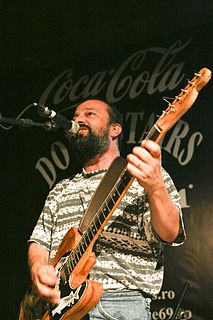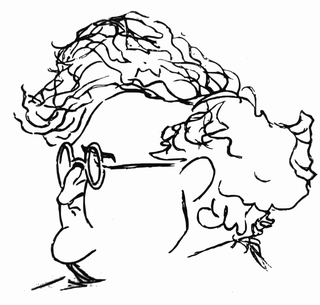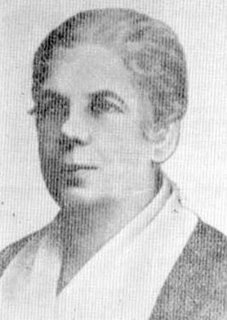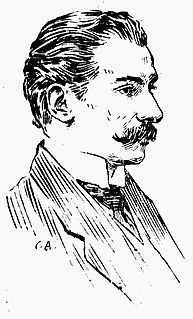 W
WDan Alexe is a Romanian journalist and filmmaker, known for his documentaries. He has been Radio Free Europe/Radio Liberty's Brussels correspondent since 1990.
 W
WAnatol E. Baconsky, also known as A. E. Bakonsky, Baconschi or Baconski, was a Romanian modernist poet, essayist, translator, novelist, publisher, literary and art critic. Praised for his late approach to poetry and prose, which transgresses the genres and introduces an aestheticized, original and progressively dark perspective to Romanian literature, he was also criticized for his early commitment to Socialist Realism and communism. Much of his work belongs to the field of travel literature, recording his experiences in the Eastern Bloc, the Far East and Soviet Union, and finally Central Europe. He was also a critically acclaimed translator of foreign works, including the Mahābhārata and poems by Jorge Semprún, Artur Lundkvist and others, the author of world literature anthologies, and the editor of monographs on Romanian and foreign painters.
 W
WNicolae Constantin Batzaria, was a Macedonian-born Aromanian cultural activist, Ottoman statesman and Romanian writer. A schoolteacher and inspector of Aromanian education within Ottoman lands, he established his reputation as a journalist before 1908. During his thirties, he joined the clandestine revolutionary movement known as the Young Turks, serving as its liaison with Aromanian factions. The victorious Young Turk Revolution brought Batzaria to the forefront of Ottoman politics, ensuring him a seat in the Ottoman Senate, and he briefly served as Minister of Public Works under the Three Pashas. He was tasked with several diplomatic missions, including attending the London Conference of 1913, but, alerted by the Three Pashas' World War I alliances and the Young Turks' nationalism, he soon after quit the Ottoman political scene and left into voluntary exile.
 W
WGeo Bogza was a Romanian avant-garde theorist, poet, and journalist, known for his left-wing and communist political convictions. As a young man in the interwar period, he was known as a rebel and was one of the most influential Romanian Surrealists. Several of his controversial poems twice led to his imprisonment on grounds of obscenity, and saw him partake in the conflict between young and old Romanian writers, as well as in the confrontation between the avant-garde and the far right. At a later stage, Bogza won acclaim for his many and accomplished reportage pieces, being one of the first to cultivate the genre in Romanian literature, and using it as a venue for social criticism.
 W
WCornel Chiriac was a Romanian journalist, radio producer, record producer and jazz drummer.
 W
WIoan Constantin Filitti was a Romanian historian, diplomat and conservative theorist, best remembered for his contribution to social history, legal history, genealogy and heraldry. A member of the Conservative Party and an assistant of its senior leader Titu Maiorescu, he had aristocratic (boyar) origins and an elitist perspective. Among his diverse contributions, several focus on 19th-century modernization under the Regulamentul Organic regime, during which Romania was ruled upon by the Russian Empire. As a historian, Filitti is noted for his perfectionism, and for constantly revising his own works.
 W
WConstantin Gane was a Romanian novelist, amateur historian, biographer and memoirist. Born into the boyar aristocracy of Western Moldavia, he worked as a lawyer in Bucharest, achieving literary notoriety with his recollections from the Second Balkan War and the Romanian front of World War I. By the 1930s, he was primarily a writer on historical and genealogical topics, famous for his contribution to women's history. An apologist for Romanian conservatism and Junimism, Gane also completed in 1936 a biography of Petre P. Carp. He was editor at Convorbiri Literare and a columnist for Cuvântul, also putting out his own magazine, Sânziana.
 W
WAdolf Edmund George de Herz, commonly shortened to A. de Herz, also rendered as Hertz and Herț, was a Romanian playwright and literary journalist, also active as a poet, short story author, and stage actor. He was the scion of an upper-class assimilated Jewish family, with its roots in Austria-Hungary. His grandfather, Adolf Sr, was a controversial banker and venture capitalist, while his father, Edgar von Herz, was noted as a translator of Romanian literature. Adolf had a privileged childhood and debuted as a poet while still in high school, producing the lyrics to a hit romance. In his early work for the stage, Herz was a traditionalist inspired by Alexandru Davila and the Sămănătorul school, but later veered toward neoclassical literature and aestheticism. His "salon comedies", staged by the National Theater Bucharest, borrowed from various authors, including Roberto Bracco, Henri Lavedan, and Haralamb Lecca, peaking in popularity in 1913, with Păianjenul. By the start of World War I, Herz was also a writer of revues.
 W
WȘerban Sebastian Huidu is a Romanian radio and TV star. He hosted, together with Mihai Găinușă, the morning show on Romanian radio station Kiss FM, and a weekly satire show on the Romanian channel Prima TV.
 W
WNicolae Iorga was a Romanian historian, politician, literary critic, memoirist, poet and playwright. Co-founder of the Democratic Nationalist Party (PND), he served as a member of Parliament, President of the Deputies' Assembly and Senate, cabinet minister and briefly (1931–32) as Prime Minister. A child prodigy, polymath and polyglot, Iorga produced an unusually large body of scholarly works, establishing his international reputation as a medievalist, Byzantinist, Latinist, Slavist, art historian and philosopher of history. Holding teaching positions at the University of Bucharest, the University of Paris and several other academic institutions, Iorga was founder of the International Congress of Byzantine Studies and the Institute of South-East European Studies (ISSEE). His activity also included the transformation of Vălenii de Munte town into a cultural and academic center.
 W
WAlexandru Mironov is a Romanian science-fiction writer, journalist, and left-wing politician. A former member of the Social Democratic Party (PSD) and Counsel for President Ion Iliescu, Mironov was Minister for Youth and Sport in 1993-1996. Since 2008, he is a member of the minor Romanian Socialist Party (PSR). He is also known as a radio and television presenter and a documentary filmmaker.
 W
WChristian Gheorghe Mititelu is a Romanian journalist. He was the director of Romanian department of the BBC.
 W
WIoan Gyuri Pascu was a Romanian pop music singer, producer, actor and comedian, also known for his participation in the comedy troupe Divertis and for his activity in Romanian cinema and television. Moving between rock music, rhythm and blues, reggae and jazz, the multi-instrumentalist Pascu founded a number of bands and registered success particularly during the early 1990s, when he was the lead singer of a group known as The Blue Workers. Pascu was the manager of several alternative music acts with his label Tempo Music, and remains an outspoken critic of Romanian commercial radio.
 W
WPerpessicius was a Romanian literary historian and critic, poet, essayist and fiction writer. One of the prominent literary chroniclers of the Romanian interwar, he stood apart in his generation for having thrown his support behind the modernist and avant-garde currents of Romanian literature. As a theorist, Perpessicius merged the tenets of Symbolism with the pragmatic conservative principles of the 19th century Junimea society, but was much-criticized over perceptions that, in the name of aesthetic relativism, he tolerated literary failure. Also known as an anthologist, biographer, museologist, folklorist and book publisher, he was, together with George Călinescu, one of his generation's best-known researchers to have focused on the work of Junimist author and since-acknowledged national poet Mihai Eminescu. Much of Perpessicius' career was dedicated to collecting, structuring and interpreting Eminescu's texts, resulting in an authoritative edition of Eminescu's writings, the 17-volume Opere ("Works").
 W
WFlorian Pittiş was a Romanian stage and television actor, theatre director, folk music singer, and radio producer.
 W
WMihai Dumitru Ralea was a Romanian social scientist, cultural journalist, and political figure. He debuted as an affiliate of Poporanism, the left-wing agrarian movement, which he infused with influences from corporatism and Marxism. A distinguished product of French academia, Ralea rejected traditionalism and welcomed cultural modernization, outlining the program for a secular and democratic "peasant state". His ideology blended into his scholarly work, with noted contributions to political sociology, the sociology of culture, and social and national psychology. He was a professor at the University of Iași and, from 1938, the University of Bucharest.
 W
WVictor Rebengiuc is an award-winning Romanian film and stage actor, also known as a civil society activist. Since 1957, he has been a member of the Bulandra Theater company, acting in more than 200 roles on that stage alone. Having had his breakthrough performance with Liviu Ciulei's The Forest of the Hanged, Rebengiuc became a major figure in Romanian cinema, and became especially known for his 1986 appearance in Stere Gulea's Moromeţii. He also starred in films by Dan Piţa and Lucian Pintilie. Rebengiuc was celebrated for his stage performances, appearing in plays directed by, among others, Ciulei, Radu Penciulescu, Andrei Şerban, Cătălina Buzoianu, Yuri Kordonsky, Gábor Tompa and Alexandru Dabija. The former husband of actress Anca Vereşti, he is married to Mariana Mihuţ, his Bulandra colleague.
 W
WIzabela Sadoveanu-Evan was a Romanian literary critic, educationist, opinion journalist, poet and feminist militant. She spent her youth advocating socialism, and rallied with left-wing politics for the remainder of her life, primarily as a representative of Poporanist circles and personal friend of culture critic Garabet Ibrăileanu. Under Ibrăileanu's guidance, Sadoveanu wrote for Viața Românească review, where she tried to reconcile ethnic nationalism and traditionalism with aestheticism. As literary critic, she championed the recognition of Symbolism as an independent cultural phenomenon, and reviewed modern developments in English literature.
 W
WAl. T. Stamatiad was a Romanian Symbolist poet, short story writer, and dramatist. A late arrival on the local Symbolist scene, he was primarily active as a literary promoter and, in 1918, editor of Literatorul review. Discovered and praised by Alexandru Macedonski and Ion Minulescu, he combined his presence in radical Symbolist circles with stints on more culturally conservative ones, crossing between the extremes of Romanian literature. By 1911, he had established himself in cultural and social circles as an exotic and vocal, sometimes violent, cultural debater.
 W
WDem. Theodorescu was a Romanian journalist, humorist, and critic, remembered for his social-themed novels but also for his controversial political stances. A committed opponent of the National Liberal Party establishment, Theodorescu frequented the avant-garde and socialist circles. During World War I, he transformed himself into a supporter of the Central Powers, and lived the occupation of Romania as a collaborationist. Like his friend Tudor Arghezi, he was imprisoned on a verdict of treason, but pardoned in December 1920.
 W
WAlexandru Tzigara-Samurcaș was a Romanian art historian, ethnographer, museologist and cultural journalist, also known as local champion of art conservation, Romanian Police leader and pioneer radio broadcaster. Tzigara was a member of the Junimea literary society, holding positions at the National School of Fine Arts, the University of Bucharest and lastly the University of Cernăuți. During his youth, he was secretary to Carol I, the King of Romania. Close to the royal family, he also served as head of the Carol I Academic Foundation, where he set up a large collection of photographic plates. Tzigara achieved fame in 1906 as founder of the "National Museum", nucleus of the present-day Museum of the Romanian Peasant, but was also involved in arranging and preserving the Theodor Aman art fund.